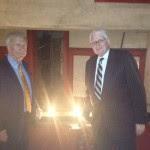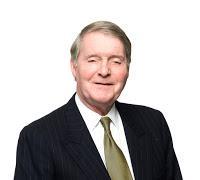
Scott Vowell and Henry Lynn
How has the close relationship between former Presiding Judge J. Scott Vowell and Sterne Agee Chairman Emeritus Henry Lynn Jr. perverted justice in Jefferson County, Alabama? A case styled William B. Cashion and Western Steel Inc. v. Mark Hayden, et al might provide a prime example.The record indicates Vowell took a number of steps to ensure the Cashion case would wind up before Circuit Judge Robert Vance Jr. on the Commercial Litigation Docket, which since has been discontinued after being found to be unconstitutional. Vance then made four critical rulings in favor of the Cashion plaintiffs, all before the case even was assigned to him. The plaintiffs--surprise, surprise--wound up prevailing on every issue in the case, but the real winners might have been the lawyers for Cashion.
Who were those lawyers? They were James P. Naftel, Tony G. Miller, and John D. Bethany Jr., from the Birmingham firm of Maynard Cooper and Gale. A shareholder, and one of 11 founding members of the Maynard firm, is George G. Lynn. With more than 40 years in the legal profession, Lynn holds senior status in one of Alabama's most prestigious firms--and it seems fair to say that he is a boss to the three lawyers in the Cashion case.
Who is George Lynn's brother? Why, that would be Henry Lynn Jr., the high-level executive at Sterne Agee who is known for his close ties to Scott Vowell. And Vowell, as presiding judge, helped ensure that George Lynn's law firm received extraordinarily favorable treatment--and lots of money--in the Cashion case. The record shows that Cashion prevailed in the case, but the big winners appear to be the lawyers from Maynard Cooper and Gale. (See document at the end of this post.)
Vowell apparently made sure the case would wind up in Judge Vance's court. Just how shady were Vance's actions and rulings? Consider the following, from the record:
* The case originally was assigned to Circuit Judge Houston Brown. Maynard lawyers went to Brown's chambers and asked him to transfer the case to Vance. Brown told them that such a request would have to go to the presiding judge, and he referred the matter to Vowell.
* Vowell was not immediately available for a ruling, but less than one hour after Brown entered his referral order, Maynard lawyers went to Vance and asked him to make a ruling in a case to which he was not assigned.
* Vance made the ruling as requested and went on to make three other rulings while the case was not assigned to him.
Here is how we described the dispute in Cashion, from an earlier post:
At the heart of the controversy is William B. Cashion, an 84-year-old businessman who is co-founder of Bessemer-based Western Steel Inc. (WSI) and a shareholder in several other Alabama corporate entities. In 2007, while in the midst of a divorce, Cashion executed a durable power of attorney, designating his nephew, Dr. Steven Mark Hayden, as his agent and attorney-in-fact. Acting in that capacity, Hayden established a Nevada trust to protect assets when his uncle began investing heavily in an Alabama gold mine.
Vance issued four rulings in the Cashion case, even though the matter was not assigned to him. All four rulings were favorable to Cashion and his attorneys from the Birmingham firm Maynard Cooper and Gale (MCG), which has contributed heavily to Vance's election campaigns. In fact, public records show that MCG lawyers gave at least $3,600 to Vance's most recent campaign, and that far exceeds the $2,000 threshold set by Alabama law, requiring Vance's recusal.
What about some of the key issues where Vance favored his financial supporters at Maynard Cooper and Gale?
* The case was filed in the wrong jurisdiction. None of the parties lived or maintained a principal place of business in the Birmingham Division of Jefferson County. Maynard lawyers apparently filed it in the Birmingham Division because they wanted the case under the control of Vowell and Vance.
* Maynard lawyers promptly sought a transfer of the case to the Commercial Litigation Docket, which would put it before Vance.
* On the day the case was filed, Vance signed a Temporary Restraining Order (TRO) at the request of Maynard lawyers, even though the case was not assigned to him. The Hayden defendants alleged that the TRO, plus Vance's other extra-judicial orders (including a preliminary injunction), prevented them from nurturing the Nevada trust, causing a loss of more than $20 million.
* Vance denied the Hayden defendants their right to a jury trial, even though they timely made such a demand in their answer. That ensured Vance would control the case without interference from a jury.
* Vance denied multiple motions for his recusal, even though state records show he had received $3,600 in campaign contributions from the Maynard firm, well above the $2,000 threshold that requires his recusal under state law.

George Lynn of
Maynard Cooper Gale
* On the Maynard lawyers' preparation of facts in Vance's final order--"Plaintiffs continue to provide pleadings to the Court that exhibit their unwavering commitment to bad faith arguments and frivolity. The courts have long frowned on orders prepared by parties for this very reason. The Supreme Court of the United States has criticized courts for adopting verbatim findings of fact prepared by a prevailing party. See Ex Parte Scott [MS. No. 1091275, 3/18/2011] __ So. 3d __ (Ala., 2011); Anderson v. City of Bessemer, 470 U.S. 546, at 572 (1985) . . .
* On Hayden's efforts to save Cashion from participation in a mining scheme, plus the abuse of Cashion by his own lawyers, from the Maynard firm--"Cashion was defrauded of at least $6 million by fraudulent mining schemes. Cashion has also been abused by the billing practices of his own attorneys. He was billed for nearly 200 hours of work to prepare a complaint and a TRO. The TRO was a verbatim cut and paste of an earlier filed TRO from the Nevada litigation. It is beyond absurd to think that the time spent preparing a complaint was justified. The plaintiffs' bills are filled with redundancies and outrageous charges. The idea of spending nearly 200 hours to produce a complaint to satisfy notice pleading is absurd, unconscionable, and abusive."
* On the mining project in which Cashion invested heavily--"It is also beyond belief that Cashion now wants the Court to enter an order referring to 10:16 Mining as an "allegedly fraudulent" mining project. Cashion has tested the site himself and found that there is no gold there, and never was. He has pulled the reclamation bond, shut down the mine and started to plant trees on the property. . . . The project is a surface mining project. Cashion's efforts to plant trees on the site leave no doubt that he has no intentions of mining the site. Cashion was so taken by the lust for gold that he may have bought out Hayden's shares, but no evidence was ever presented that Hayden profited from any such transaction."
* On the horrendous nature of Cashion's investment in the gold project--"Cashion's involvement is not just a 'bad investment.' Independent testing of the property was done, and Cashion was informed that there were no precious metals on the property. Despite this information, he invested at least $6 million in the project. In return, he received $10.00 worth of gold. . . . Even after being informed of the fraud and witnessing the results of his investment, he continued to insist that the 'investment' was the greatest gold find east of the Mississippi. He informed his family and friends that he intended to continue to invest. Only a delusional person would insist on continuing to 'invest' under such circumstances. . . . Hayden simply undertook responsible actions to protect Cashion. There is no question that Cashion was saved millions of dollars by the actions of Defendants."
* On the Maynard firm's claim for attorney fees in excess of $1.5 million--"Plaintiffs have requested that they be awarded fees for efforts expended in other matters, in other jurisdictions. . . . The rates charged to plaintiff are simply outlandish. The reasonable rates in the community are simply not what was charged in this matter. Counsel has charged $480.00 to $345.00 per hour for shareholders and $200,00 to $225.00 per hour for associates with five or less years experience. Counsel has also billed $400.00 for travel time, a rate nearly double that charged for in-court work. It is difficult to imagine how sitting on an airplane is more taxing than presenting evidence and arguments at hearings. Counsel has also charged $170.00 per hour for paralegal services . . . this rate again is double what is customary. Counsel's rates are abusive and unwarranted."
* On the Maynard firm billing almost 200 hours before even filing its complaint--"Counsel's billing in this regard is excessive, redundant, unnecessary, and trades the role of advocate for parasiti curiae. The complaint and the cut and paste TRO motion should have taken five hours or less to compose. Counsel requests hundreds of hours for talking amongst themselves about the case. Billing for three-hour phone calls, and conferences between themselves. This pattern is repeated week after week throughout the billing records. The records submitted to the Court are a case study in elder abuse through overbilling by attorneys. In short, the bills submitted to the Court are excessive if not fraudulent."
William Cashion won the case, but it does not appear that he came out a winner. Public records indicate a gold-mining scheme took him for a ride to the tune of $6 million. When Cashion's nephew tried to put a stop to that scam, the elderly businessman found the Maynard firm to file a lawsuit--and they nailed him for more than $1.5 million in charges. The final judgment indicates Cashion did not receive anywhere near that amount in damages. (The final judgment is embedded at the end of this post.)
This seems to be a clear case of Maynard Cooper and Gale benefiting because one of its founding shareholders (George Lynn) has a brother (Henry Lynn, of Sterne Agee), who has an unusually close relationship with the man (Scott Vowell) who used to preside over the Jefferson County Courthouse.
God only knows how many other cases have been decided based on similar favoritism.
Cashion-Hayden Response to Findings of Fact by Roger Shuler
Cashion-Final Judgment by Roger Shuler
